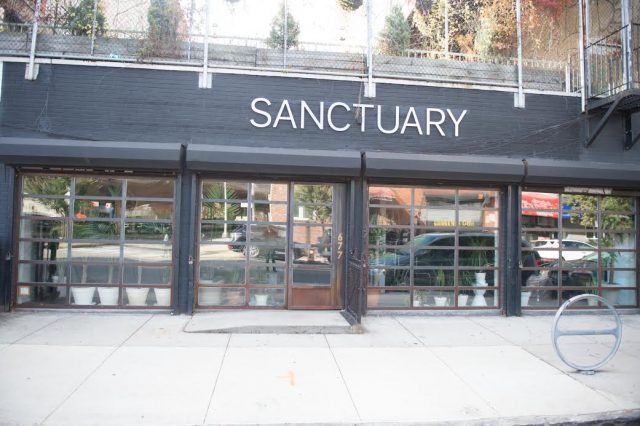
So, you want to be a chef in New York City?
First off, don’t. The hours are usually absurdly long, with the overtime just barely making your obscenely low pay livable. The stress of the job is usually said to be on par with surgeons and airline pilots, and it goes on for a large portion of the night. The hours strand you in a world where you’re wandering the city while everyone else is working, and you’re working when they’re having fun.
So, despite my warning it still sounds worth it? Well OK, here’s a tip to start: Don’t go to culinary school.
CULINARY SCHOOL ISN’T A NECESSARY INGREDIENT FOR NYC RESTAURANT SUCCESS
The first thought for many people who want to get into the restaurant industry but don’t know anyone in it is: “culinary school.” It’s a hotly debated topic of whether or not it pays off, but in most cases, it doesn’t. Breaking in to an industry with notoriously low wages by paying for school which will sometimes cost more than spending that same amount of time at Harvard ($43,000 for 7 months, in my case) is not a great way to get your start. Carlos Bolanos, a line cook at Brooklyn Star and self-taught chef agrees. “Why spend your money if, in the end, you’re gonna get the same position as the guy who didn’t go to culinary school anyways?”
More importantly, what they teach you at the school is equivalent to maybe 10% of what you’ll learn your first day in the professional kitchen.
I’ve gone to culinary school, and the biggest perks that I found it offers are the connections you can make, but you can make those for free, and they don’t guarantee anything. About a quarter of my graduating class is still involved in the restaurant world, with the rest fleeing back to the industries from whence they came within six months of graduation. Only a select few are still in New York, and they are still hard at work trying to break through the ranks, and will be trying for quite some time. I graduated from the French Culinary Institute (now International Culinary Center) in 2010, and my degree has helped me only in the smallest capacity.
Does culinary school provide any benefit? Well, it helps with basic knife skills, and teaches you the theory of cooking, but no more than practice and a few Alton Brown books would do, and for much cheaper. “Culinary school gives you a bit of a head start, but everything learned in culinary school can be learned in the kitchen,” Nathan Jay Meyer, a working chef in New York City, said. “In fact, the demands of the kitchen make you learn faster and more precisely.”
Several large hotel groups do recruiting straight from the diploma line in most schools, so if want to get a foot in the door outside of the New York food world, then culinary school might be for you. However, if you’re looking to cook in the Big Apple, then that diploma isn’t impressing anybody.
GETTING IN WITHOUT THE DEGREE
So, we’re in agreement: let’s skip culinary school. How are you gonna end up a chef in that case?
The biggest factor in whether you get a kitchen job and how good it is isn’t school, and sometimes doesn’t even involve how good you are. Like every other industry in this world, there’s a fair share of networking. There are thousands of chefs in New York City, many with comparable skills, and if you don’t know the person offering the job, they usually know someone as good as you that they like more. However, no matter who you know, determination is going to be a key factor once you get your start on the line. You can know every chef in New York, but if you don’t show that you’re determined and willing to work the first second you walk into a kitchen, you’ll be out faster than last week’s fish.
In culinary school, they start you off with something called “staging” (soft “a”), where you basically work as an intern, for little to no pay. This is where you’ll really learn how a kitchen functions, including knife skills (prepping tons of ingredients for service, including peeling potatoes, picking herbs and cutting onions), hygiene (cleaning every damn thing in the kitchen. Twice) and maybe some cooking if you’re lucky. To find out if you can stage somewhere, simply pick a nice restaurant, but not too nice, and just ask. It’ll take a few tries, but you’ll eventually get your foot in the door, and from there it’s all about proving yourself to make the line. It’s here that you’d be making some of the connections you’d otherwise have to pay thousands for, and hey look, you did it for free! Like working as an intern, however, staging means that you’re being paid solely in experience and staff meals. Which is not great. While culinary schools usually pay someone specifically to get in touch with restaurants and arrange the stage for you, you’re essentially paying for an internship opportunity, and doesn’t that sound crazy?
Staging works as a great alternative to culinary school, as Chris Peterson, sous chef at Roadhouse in Los Angeles, said: “Staging at a great place is better financially and just as good in terms of developing skills. Nowadays everyone is encouraged to ‘invest’ in higher education, but once you get out in the real world you will see kids from all over the world staging at great places [in lieu of culinary school].” If the kitchen doesn’t bring you on, which they’re not obligated to, your best bet is looking for work as a prep chef or a dishwasher.
From here you can “trail” at restaurants for a line cook position, essentially an audition. Even cooler, you’re not paid for this either, and restaurants have been known for trailing candidates for weeks in an effort to keep costs down. Finally, you get a line cook position, and from there it’s a hierarchy. Start at garde manger, which is cold dishes and salads, working your way up to apps, then grill, then sous chef, then executive. There are also several other French titles you’re likely to encounter along the way.
Once you reach the sous level you can also work to make connections and get your own place where you will be executive chef, but it will usually be around five years at the least before you can reach a position like that. Restaurants work by giving whatever you’re looking to take, so your best bet at advancement is to try to take on all the responsibility that you can and try not to let your head explode (and here’s where the drug epidemic that plagues chefs comes in).
There are other avenues to starting out in the restaurant world as well. You can try volunteering at events, from charity events to movie festivals to cook-offs, where you’ll almost never be paid, but you do get the chance to work closely with other chefs and show off your stuff. Just keep your eyes open for food events that you see in the press that charge less than $20 per head. Even if the event has a celebrity chef attached, a lot of the additional staff will just be people who were willing to give up a Saturday. Additionally, if you consider yourself exceptionally hip, you can try starting a supper club with some friends and getting some buzz going around your name that way (also, they’re just a fun thing to do).
Overall, being a chef is incredibly difficult work, akin to working on an assembly line for your first few years and demanding an outrageous schedule the further in you get. If you truly love the physical and mental test of restaurant cooking, then none of that has scared you off though. But with all the odds already against you, it makes sense to at least not be fifty grand in the hole before you get started.
Alternately, you could always just invent the next cronut.
5 Comments
Leave a Reply




Holy shit! Kenji!!!
Awesome I agree wholeheartedly,but I would love to go to school even at 41 and in the business for nearly 20 years
I went to a free year long culinary program in new york which I will not mention because the chef is a fat F@%king scum bag of the first order. His so large from sampling everybodies dishes that the fat in the back of his eye sockets are push out his eye balls. Disgusting! It is a terribly crappy industry but you still need to know certain methods and techniques and understanding everything from table settings to ratio’s and how to think of ingredients and whats available. It’s the verbal abuse and yelling and screaming that ticks me off. There are many morronic, emotionally and mental disturbed people who have serious brain damage with gigantic egos to go with they’re truly ugly looks. But people do eat food and spend money on it. Food is the largest national and export business in America above all else after food get into the funeral business or the illegal sex trade because everybody needs and wants it. It’s work but if you own it and It’s yours. If you work for someone to pay your dues you deserve to waste your twenties and thirties on that propaganda but going it on your own and starting super small sometimes is worth it because there’s nothing better then to flip your middle finger at those interdependent self proclaimed arrogant snot nosed professionals (professional just means your getting paid to do something it doesn’t mean your good at it). Sorry I’m not bitter or angry I’m a native New Yorker with a punch your lights out attitude. Love what you do but don’t fall in love with it because you won’t be doing it forever. As for the rest of you, go play in traffic. Ciao baby…
Would that school your talking about be co-op tech
Great article! I believe you can still take a couple of classes to learn new techniques. You can always learn something new:
https://www.vimbly.com/nyc-cooking-classes